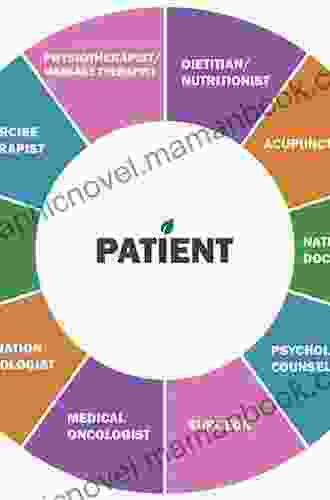Transforming Healthcare: A Comprehensive Guide to the Patient-Centered Nursing Process Approach

The healthcare industry is undergoing a paradigm shift, transitioning from a traditional, provider-centric model to a patient-centered approach. At the heart of this transformation lies the Patient-Centered Nursing Process Approach (PCNPA),a holistic framework that empowers patients and nurses to collaborate in optimizing healthcare outcomes.
4.8 out of 5
| Language | : | English |
| File size | : | 231656 KB |
| Text-to-Speech | : | Enabled |
| Enhanced typesetting | : | Enabled |
| Print length | : | 798 pages |
This article delves into the PCNPA, exploring its benefits, key principles, steps, and real-world applications. By embracing this approach, nurses can become true advocates for their patients, fostering a therapeutic partnership that leads to improved health outcomes, increased patient satisfaction, and reduced healthcare costs.
Benefits of the Patient-Centered Nursing Process Approach
- Empowers patients: PCNPA recognizes patients as active participants in their healthcare, fostering their involvement in decision-making and promoting self-care.
- Improves patient outcomes: By focusing on individualized care plans that address the unique needs of each patient, PCNPA helps improve treatment efficacy and patient recovery.
- Enhances patient satisfaction: Patients feel more involved and valued in the healthcare process, leading to increased satisfaction and adherence to treatment plans.
- Promotes interdisciplinary collaboration: PCNPA encourages collaboration among healthcare professionals, ensuring a comprehensive and coordinated approach to patient care.
- Reduces healthcare costs: By preventing unnecessary treatments and improving patient outcomes, PCNPA helps reduce overall healthcare costs.
Key Principles of the Patient-Centered Nursing Process Approach
- Respect for patient autonomy: Patients have the right to make decisions about their own healthcare, and their choices should be respected.
- Holistic care: PCNPA considers all aspects of the patient's life, including physical, emotional, social, and spiritual needs.
- Evidence-based care: Treatment decisions are based on the latest scientific evidence and research.
- Collaboration: Nurses work closely with patients, families, and other healthcare professionals to develop and implement care plans.
- Evaluation and ongoing improvement: Care plans are regularly evaluated and adjusted to ensure they are meeting the patient's evolving needs.
Steps in the Patient-Centered Nursing Process Approach
- Assessment: Gather data about the patient's health status, including physical, emotional, and social factors.
- Diagnosis: Identify the patient's health problems or potential risks.
- Planning: Develop a personalized care plan that addresses the patient's unique needs.
- Implementation: Carry out the care plan in collaboration with the patient.
- Evaluation: Monitor the patient's progress and adjust the care plan as needed.
Real-World Applications of the Patient-Centered Nursing Process Approach
The PCNPA can be applied in various healthcare settings, including:
- Hospital care: Nurses can use PCNPA to develop individualized care plans for patients admitted to the hospital, ensuring their needs are met and their recovery is optimized.
- Outpatient care: PCNPA helps nurses provide comprehensive care to patients in outpatient settings, promoting self-management and empowering them to live healthier lives.
- Home healthcare: Nurses can use PCNPA to assess the needs of patients in their own homes, providing personalized care and support to improve their quality of life.
- Long-term care: PCNPA helps nurses provide holistic care to residents of long-term care facilities, addressing their physical, emotional, and social needs.
- Telehealth: Nurses can use PCNPA to provide virtual care to patients, reducing barriers to access and fostering patient empowerment.
The Patient-Centered Nursing Process Approach is a transformative framework that empowers patients and nurses to collaborate in optimizing healthcare outcomes. By embracing its principles, nurses can become true advocates for their patients, fostering a therapeutic partnership that leads to improved health, increased patient satisfaction, and reduced healthcare costs.
As the healthcare industry continues to evolve, the PCNPA will play an increasingly vital role in ensuring that patients receive the personalized, holistic care they deserve. By embracing this approach, nurses can become change agents, revolutionizing healthcare delivery and making a profound impact on the lives of their patients.
4.8 out of 5
| Language | : | English |
| File size | : | 231656 KB |
| Text-to-Speech | : | Enabled |
| Enhanced typesetting | : | Enabled |
| Print length | : | 798 pages |
Do you want to contribute by writing guest posts on this blog?
Please contact us and send us a resume of previous articles that you have written.
 Top Book
Top Book Novel
Novel Fiction
Fiction Nonfiction
Nonfiction Literature
Literature Paperback
Paperback Hardcover
Hardcover E-book
E-book Audiobook
Audiobook Bestseller
Bestseller Classic
Classic Mystery
Mystery Thriller
Thriller Romance
Romance Fantasy
Fantasy Science Fiction
Science Fiction Biography
Biography Memoir
Memoir Autobiography
Autobiography Poetry
Poetry Drama
Drama Historical Fiction
Historical Fiction Self-help
Self-help Young Adult
Young Adult Childrens Books
Childrens Books Graphic Novel
Graphic Novel Anthology
Anthology Series
Series Encyclopedia
Encyclopedia Reference
Reference Guidebook
Guidebook Textbook
Textbook Workbook
Workbook Journal
Journal Diary
Diary Manuscript
Manuscript Folio
Folio Pulp Fiction
Pulp Fiction Short Stories
Short Stories Fairy Tales
Fairy Tales Fables
Fables Mythology
Mythology Philosophy
Philosophy Religion
Religion Spirituality
Spirituality Essays
Essays Critique
Critique Commentary
Commentary Glossary
Glossary Bibliography
Bibliography Index
Index Table of Contents
Table of Contents Preface
Preface Introduction
Introduction Foreword
Foreword Afterword
Afterword Appendices
Appendices Annotations
Annotations Footnotes
Footnotes Epilogue
Epilogue Prologue
Prologue Quercus Poetry
Quercus Poetry Jane Bull
Jane Bull Tessa Ward
Tessa Ward Ray Dalio
Ray Dalio Lena Empyema
Lena Empyema Kathleen Puente
Kathleen Puente Kohei Horikoshi
Kohei Horikoshi Erica Bauermeister
Erica Bauermeister Gloria Evans
Gloria Evans Jeremy Bailenson
Jeremy Bailenson Dana Suskind
Dana Suskind John Domus Cruo
John Domus Cruo Bronwyn Houldsworth
Bronwyn Houldsworth Lewis M Weinstein
Lewis M Weinstein Ayushee Roy
Ayushee Roy Lucie Brock Broido
Lucie Brock Broido Wil Wheaton
Wil Wheaton Lily Baxter
Lily Baxter Antonio Mira De Amescua
Antonio Mira De Amescua Gael Wood
Gael Wood
Light bulbAdvertise smarter! Our strategic ad space ensures maximum exposure. Reserve your spot today!

 Israel BellThe Minimalist Ten Commandments: Erika Busecan's Guide to Decluttering Your...
Israel BellThe Minimalist Ten Commandments: Erika Busecan's Guide to Decluttering Your... Chris ColemanFollow ·7.8k
Chris ColemanFollow ·7.8k Anthony WellsFollow ·19.5k
Anthony WellsFollow ·19.5k Leo MitchellFollow ·12.3k
Leo MitchellFollow ·12.3k Darnell MitchellFollow ·13.4k
Darnell MitchellFollow ·13.4k Joel MitchellFollow ·13.3k
Joel MitchellFollow ·13.3k Jerome BlairFollow ·5k
Jerome BlairFollow ·5k Terry BellFollow ·5k
Terry BellFollow ·5k Herman MelvilleFollow ·14.1k
Herman MelvilleFollow ·14.1k

 Rex Hayes
Rex HayesWorld of Dead Volume Issue: An In-Depth Analysis
The World of Dead volume issue...

 Nathan Reed
Nathan ReedHard Lessons Learned from ERP Rollouts: A Hivemind...
Enterprise...

 Fernando Bell
Fernando BellWith the Light, Vol. 1: Illuminating the Extraordinary...
The advent of parenthood is a...

 Wesley Reed
Wesley ReedNo Helping Hand: True Story of Deadly Waves
In December 2004,...

 Ruben Cox
Ruben CoxIntroduction to Electrodynamics by David Griffiths: A...
to Electrodynamics by...
4.8 out of 5
| Language | : | English |
| File size | : | 231656 KB |
| Text-to-Speech | : | Enabled |
| Enhanced typesetting | : | Enabled |
| Print length | : | 798 pages |











